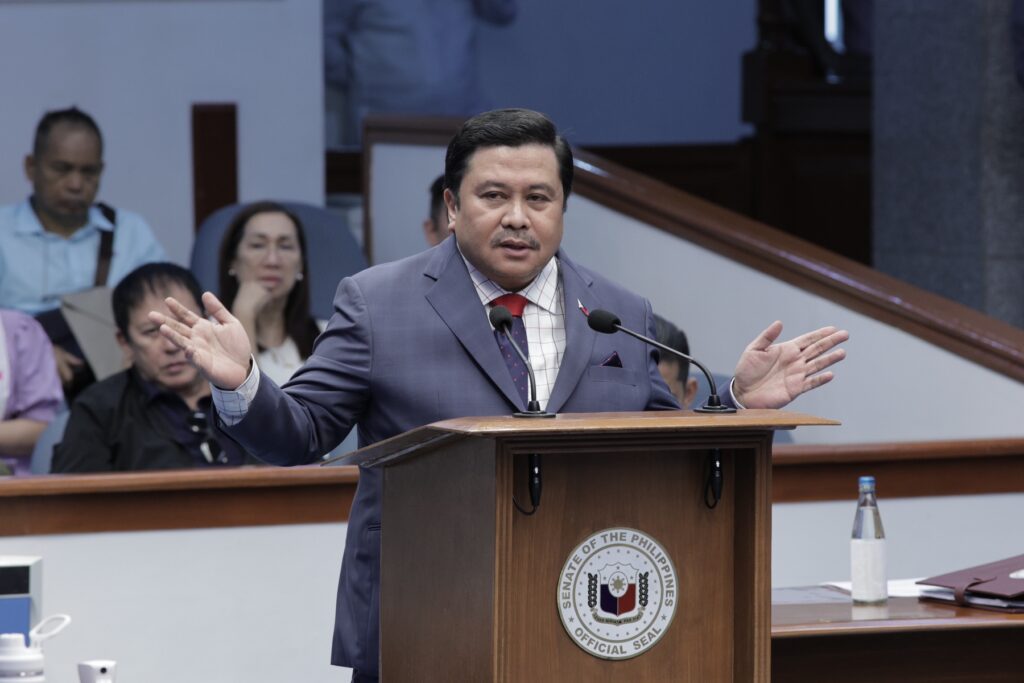SENATOR Jinggoy Ejercito Estrada is backing efforts of his colleagues to pass a law that would require private universities and colleges to waive entrance examination fees for underprivileged graduating high school students and those who rank in the top 10 percent of their graduating class.

Estrada noted the increasing number of high school graduates in the country, as indicated by the 2020 census conducted by the Philippine Statistics Authority (PSA), which represents a significant milestone in terms of access to the country’s secondary education.
“Ang pagdami ng bilang ng mga high school graduates ay marapat lamang na suportahan ng ating pamahalaan sa pamamagitan ng pagsisiguro ng patuloy na pag-aaral nila sa kolehiyo. Isang paraan upang makamit ito ay ang pagsasabatas ng ‘Free College Entrance Examinations Act,’” Estrada said, referring to Senate Bill 2441, which he co-authored and co-sponsored.
According to the 2020 PSA census, over 21% of Filipinos have attained at most a high school diploma, which is higher than the 19% recorded in 2010 and 13.5% in 2000.
“Ang hindi pagbayad sa entrance exam fee lamang na nakapaloob sa panukalang ito ay malaking bagay na para sa mga mag-aaral natin, lalo na para sa kanila na nasa pribadong paaralan ang mga napupusuang kurso o para sa mga mag-aaral na ang pinakamalapit na paaralan sa kanilang tahanan ay pribadong institusyon,” Estrada said in his co-sponsorship speech.
The proposed legislation offers mutual benefits for both students and schools, the veteran lawmaker said.
As it broadens students’ options for colleges and universities to pursue their studies, it also opens the doors of private higher education institutions (PHEIs) to high-achieving students who will undoubtedly contribute to their reputation and performance, Estrada pointed out.
Under the bill’s provisions, eligible students must come from families whose parents live below the poverty line or belong to the poorest of the poor, as determined by the National Economic and Development Authority (NEDA) and the Department of Social Welfare and Development (DSWD) and must belong to the top 10 percent of their graduating class.
Libreng college entrance exam para sa mahihirap at kwalipikadong estudyante, kinatigan ni Jinggoy
SUPORTADO ni Senador Jinggoy Ejercito Estrada ang isinusulong na batas ng kanyang mga kasamahan na mag-aatas sa mga pribadong unibersidad at kolehiyo na gawing libre ang entrance examination para sa mahihirap na graduating high school students at mga kabilang sa top 10% na nagtapos sa secondary education.
Ani Estrada, patunay na lumalawak na ang nakikinabang sa secondary education ng bansa base sa 2020 census na isinagawa ng Philippine Statistics Authority (PSA) na nagpakita ng pagtaas ng bilang ng mga nagtatapos ng high school sa bansa.
“Ang pagdami ng bilang ng mga high school graduates ay marapat lamang na suportahan ng ating pamahalaan sa pamamagitan ng pagsisiguro ng patuloy na pag-aaral nila sa kolehiyo. Isang paraan upang makamit ito ay ang pagsasabatas ng ‘Free College Entrance Examinations Act,’” sabi Estrada patungkol sa Senate Bill 2441 na kanyang isinusulong at sinusuportahan.
Ayon sa 2020 PSA census, mahigit sa 21% ng mga Pilipino ang nagtamo ng high school diploma, mas mataas sa 19% na naitala noong 2010 at 13.5% noong 2000.
“Ang hindi pagbayad sa entrance exam fee lamang na nakapaloob sa panukalang ito ay malaking bagay para sa mga mag-aaral natin, lalo na para sa kanila na nasa pribadong paaralan ang mga napupusuang kurso o para sa mga mag-aaral na ang pinakamalapit na paaralan sa kanilang tahanan ay pribadong institusyon,” ani Estrada sa kanyang co-sponsorship speech.
Malaking pakinabang ang nasabing panukalang batas sa mga mag-aaral at paaralan. Habang pinapalawak nito ang opsyon ng mga mag-aaral sa papasukang institusyon, maaari itong makaambag sa pagtaas ng reputasyon at performance ng private higher education institutions (PHEIs) sa pagkakaroon ng mga high-achieving students.
Sa ilalim ng mga probisyon ng panukalang batas, kwalipikado ang mga mag-aaral na mula sa pinakamahirap na pamilya o nasa ilalim ng poverty line ayon sa itinakda ng National Economic and Development Authority (NEDA) at ng Department of Social Welfare and Development (DSWD) at dapat rin na kabilang sa nangungunang 10% ng graduating class.

